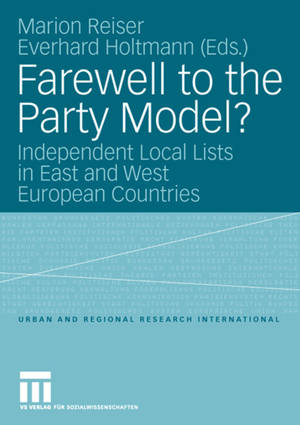
- Afhalen na 1 uur in een winkel met voorraad
- Gratis thuislevering in België vanaf € 30
- Ruim aanbod met 7 miljoen producten
- Afhalen na 1 uur in een winkel met voorraad
- Gratis thuislevering in België vanaf € 30
- Ruim aanbod met 7 miljoen producten
Zoeken
Farewell to the Party Model?
Independent Local Lists in East and West European Countries
€ 52,95
+ 105 punten
Omschrijving
Marion Reiser, Everhard Holtmann Local independent lists as political actors are a common phenomenon on the local level in many European countries - in established Western democracies as well as in the 'new' democracies in Central and Eastern Europe. In some West European countries, these non-partisan groups have been an established and stable element in the local political system for decades. Ty- cally, they understand themselves as protectors of a harmonious factual political style. In their opinion, good local politics is not compatible with party politics so they consequently perceive themselves as non-parties. During the last two d- ades, presence and success of local lists have steadily increased in these co- tries. Furthermore, during the last years local lists emerged also in countries which had been formerly fully party-politicised on the local level. Explanations offered for these developments are often based on the observation of a general decline of trust in established parties and politicians. Hence, it has been argued that the disenchantment with political parties is a fertile ground for local lists. For the Central and East European countries, this argument can be - ployed only to a certain extent. Local lists established themselves in the early 1990's as important actors on the local level especially due to a lack of party organisation in the process of democratic consolidation.
Specificaties
Betrokkenen
- Uitgeverij:
Inhoud
- Aantal bladzijden:
- 290
- Taal:
- Engels
- Reeks:
- Reeksnummer:
- nr. 11
Eigenschappen
- Productcode (EAN):
- 9783531156873
- Verschijningsdatum:
- 11/04/2008
- Uitvoering:
- Paperback
- Formaat:
- Trade paperback (VS)
- Afmetingen:
- 148 mm x 210 mm
- Gewicht:
- 394 g

Alleen bij Standaard Boekhandel
+ 105 punten op je klantenkaart van Standaard Boekhandel
Beoordelingen
We publiceren alleen reviews die voldoen aan de voorwaarden voor reviews. Bekijk onze voorwaarden voor reviews.










